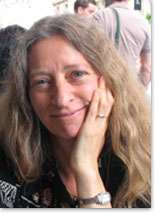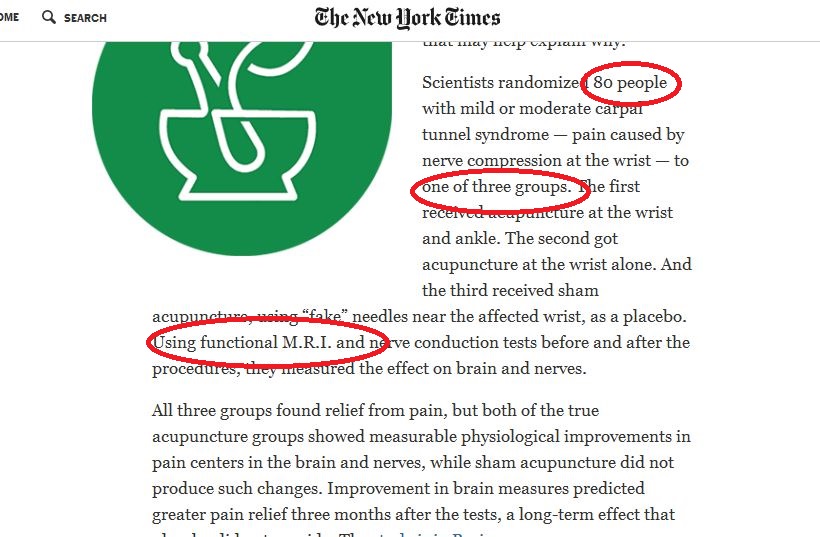When will science media do the same? I am not talking about criticizing Gwyneth Paltrow's Goop nonsense or discussing the merits of vaccines with elites on the coast, that is low-hanging fruit, I am talking about demanding the same level of accountability from political allies as we do their opposition.
On surveys, 65 million people claim to care about science and read it at least once per month. They sure are not getting it from newspapers. Interest has plummeted among national papers to where only the New York Times has a recurring science section - and it is far too often given over to promoting acupuncture, cosmic claims based on small samples and pseudoscience (1) - while their political journalists, like Danny Hakim and and Eric Lipton, routinely manufacture conspiracy stories about scientists. The New York Times is the go-to publication of "liberals" in America, so it is no surprise they endorse alternative medicine and organic food and don't see a market for real science journalism. They are not alone. Washington Post can, without any critical self-reflection at all, host an entire panel on food science and staff it with nothing but organic trade group reps and organic farmers. (2)
That kills the credibility of all science media, and political allies need to take off the blinkers if we are to save our own field. A few weeks ago, political journalists Liza Gross (who somehow holds the title of Senior Editor at the science journal PLOS Biology) and Carey Gillam (who holds the meaningless title of "Research" Director for US Right To Know, an organic industry front group) (3) both wrote conspiracy tales alleging that the pro-science community is a corporate front.

Political journalist Liza Gross. Credit: New York University Journalism department, which gave her an award for her progressive good deeds. Coincidentally, after she got the award one of them published a smear piece on scientists at the company where she is Senior Editor, PLOS. It was retracted after outrage by the science community.
Not only was this stuff not shouted down by science media, it was even reprinted in stalwart bastions of liberalism like Salon and Undark. (4) Instead of being embarrassed by it, the current crop of editors, all of whom are at an age when they saw science academia lurch to the left and thus found a circle of affirmation for their beliefs, have continually rewarded it. They promote the notion that there is some scary Republican War on Science and that they, as devout Democrats, are the Party of Science. And so they let this kind of nonsense be foisted off on the public.
I don't need to single out Gillam and Gross, they just happen to be the most recent. I could just as easily have gone a little farther back and talked about Paul Thacker or Dan Fagin or Deborah Blum or Charles Seife or Michael Balter or plenty of others who believe the same things those two wrote. They are all deniers for hire or enabling them because they won't put science ahead of their political goals. Almost all have had ethical concerns about their work or had articles retracted or been fired for framing their claims about science through their politics. They are even aided by fellow advocates like Naomi Oreskes and Marion Nestle and plenty of others who see corporate bogeymen everywhere in non-government science. (5)
They are an isolated group and would remain so if we weren't giving these people a free pass because they are hiding under our political umbrella. Really, they shouldn't be allowed. These are not pro-science liberals, they are anti-science social authoritarian progressives who promote fear and doubt out our food supply, about medicine, about energy. They want to ban everything. Their beliefs hurt poor people in developing nations, their advocacy leads to starvation or being denied new medicines or sanitation. They hate progress.
There is hope. Stanford's Mark Jacobson, a computer scientist who has remade himself as a global warming and alternative energy expert, was widely jeered because he sued PNAS for publishing a paper which debunked some of his more cosmic claims about solar and wind power, claiming that it was economically and technologically viable if those nasty Republicans would get out of the way.
Now, mostly his paper only got a critical look because he sued, not because of its content. When his work was first published, those who are uniformly opposed to mainstream energy science gushed about his work. But regardless of why, they are critical of him now, so at least we are taking baby steps toward science media once again being a politically neutral force for public good.
NOTES:
(1) Here is an example where they managed to do all three in one article:

(2) Groups like Food Tank are likewise thinly-veiled public relations efforts for the political demographic that is most likely to be against food, energy, medicine and certainly chemicals.
(3) Gillam was fired from Reuters after an investigation of her work showed her to be too biased against conventional farming for it to be evidence-based. She was immediately hired by the industry group whose press releases she used for stories and whose leader she quoted often.
(4) Gross is so bananas she took an anti-smoking professor's criticism of cigarette company RJR as being a sign he was secretly being bought off by them.
(5) Except when they are paid "to give talks" with money laundered through activist groups so they can say they don't take corporate funding directly.
Like Gillam, Gross is very transparent about her anti-science beliefs. She proudly worships at the altar of Environmental Health News, where guru Pete Myers practically invented the fancier-sounding homeopathy known as the endocrine disrupting chemicals craze.





Comments